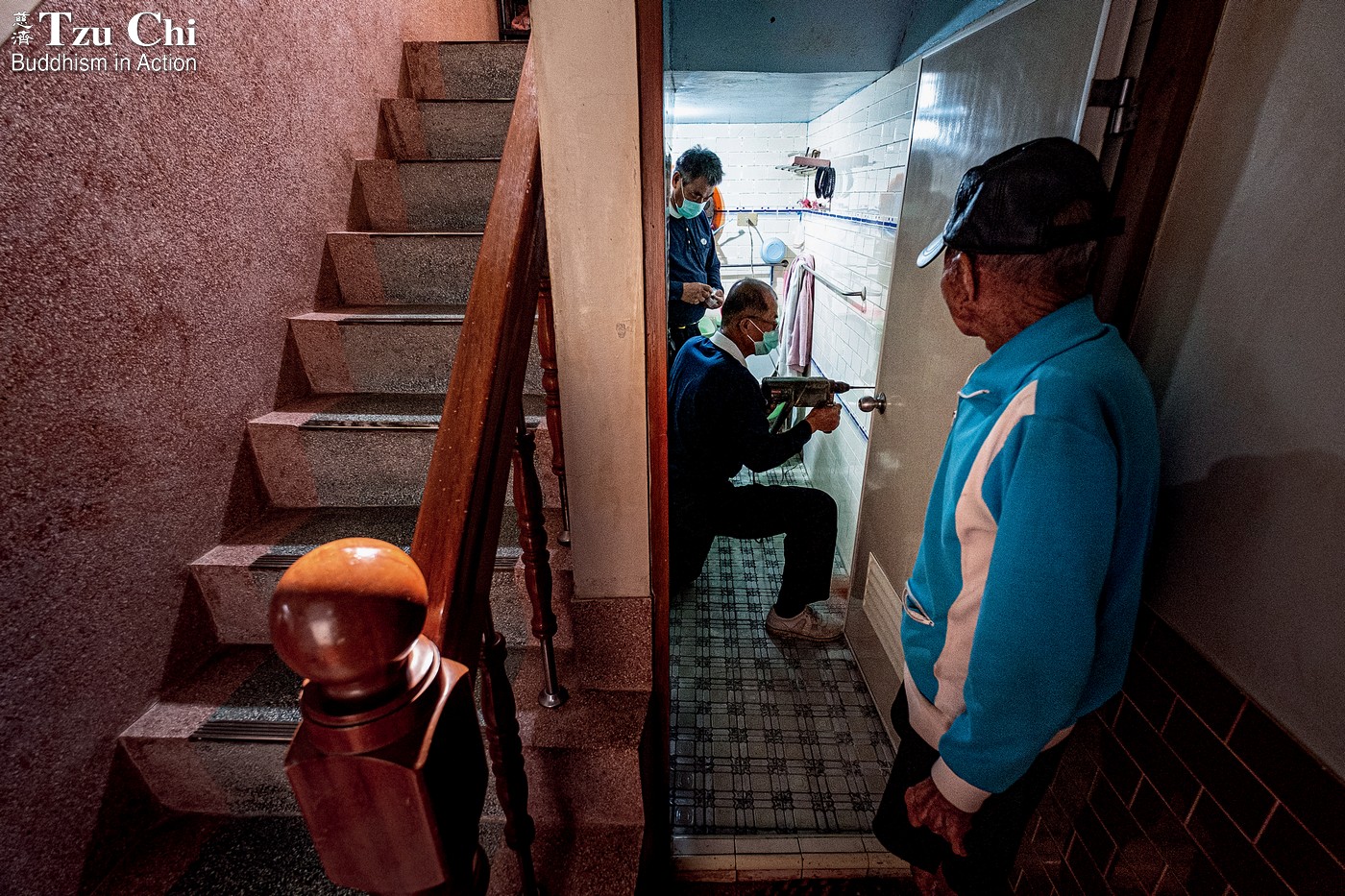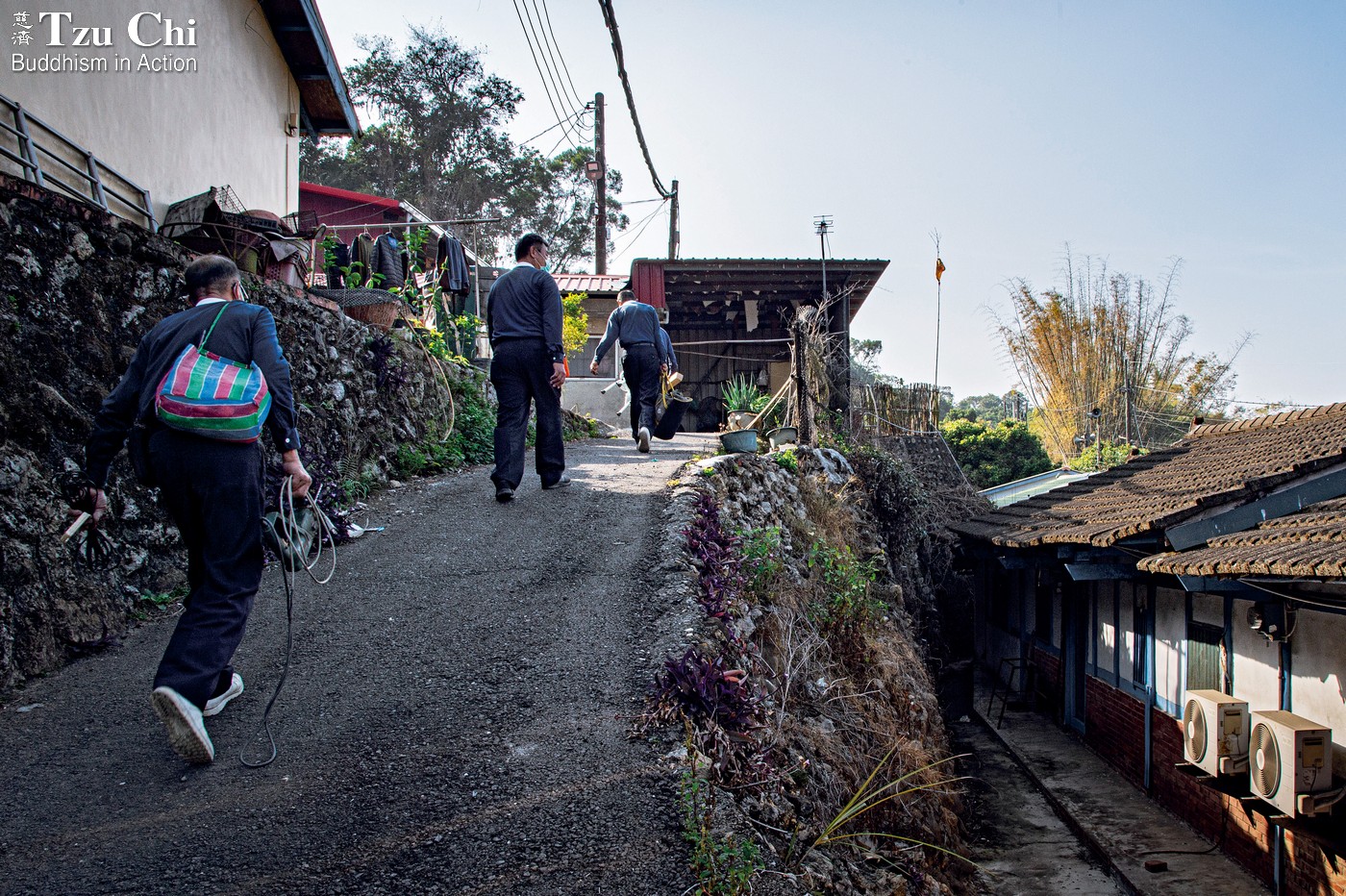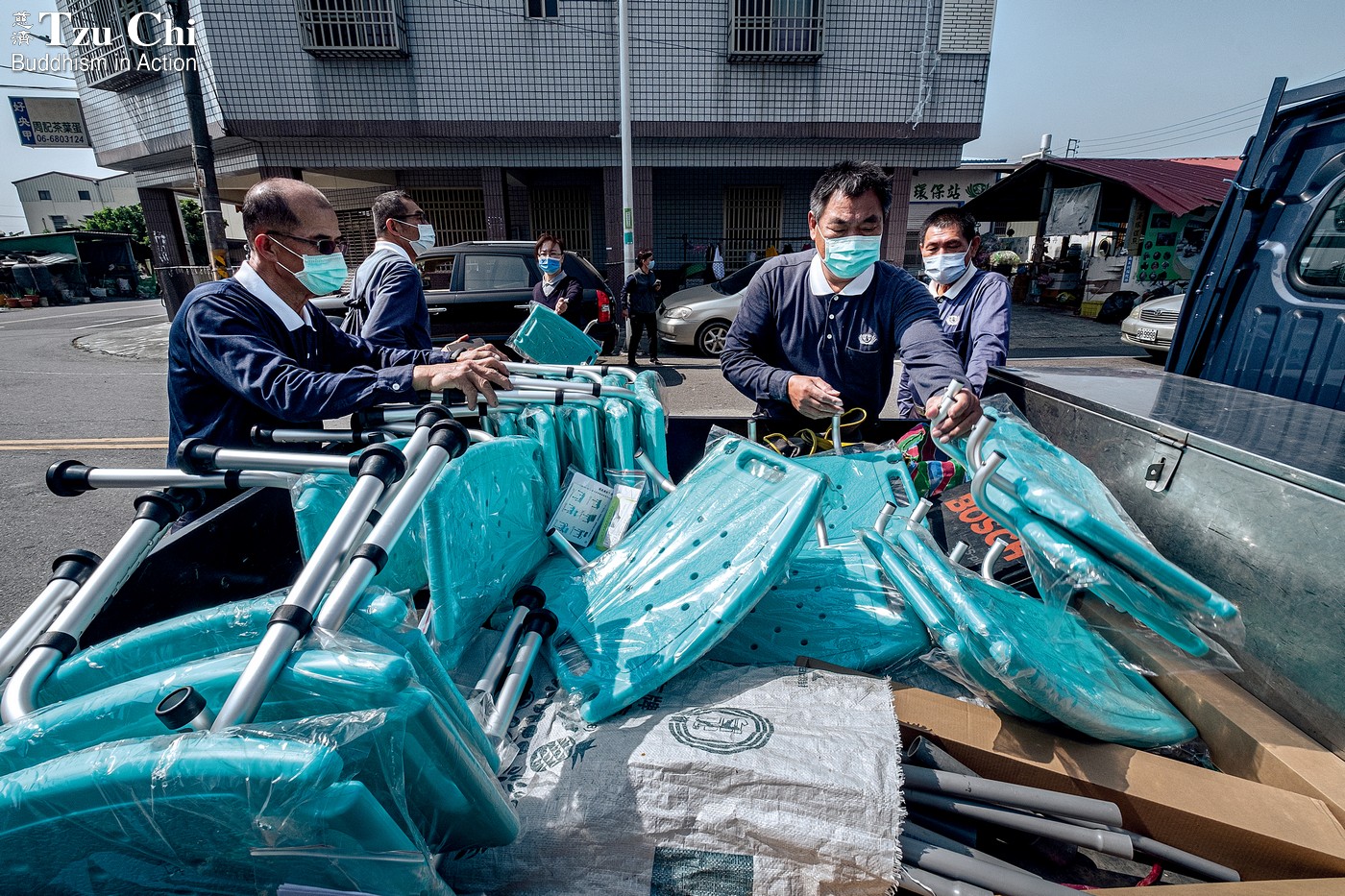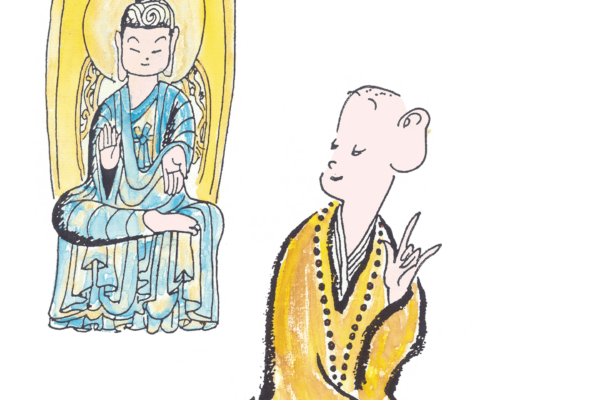By Wen Bao-qin
Translated by Wu Hsiao-ting
Photos by Huang Xiao-zhe
Tzu Chi launched the “Safe Homes, Caring Communities” project in Taiwan in March 2020. One of the initiatives involves collaborating with neighborhood chiefs to enhance home safety for elderly individuals living alone, disabled people, and vulnerable families. By the end of 2022, 3,750 households had benefited from this initiative.

A volunteer drills into a wall to install a grab bar in a household with older residents.
On a pleasant day in March 2021, 43 Tzu Chi volunteers and five social workers from the Tzu Chi Tainan office set out for the neighborhood of Gaoyuan in the Dongshan District of Tainan City, southern Taiwan. They were visiting 50 households consisting of seniors living alone or individuals with disabilities based on a list provided by the neighborhood chief. Seven local residents, also Tzu Chi volunteers, were guiding them on those visits.
As soon as the visiting team entered the rural Dongshan District, they were greeted by picturesque rice fields and slopes adorned with orchards. This district is devoid of factories, creating challenges for young people to find employment and build stable lives. As a result, many of them have left to seek opportunities in other places, leaving behind elderly parents who rely on each other for support. Some elderly individuals have lost a spouse, leading to a life of solitude. Others have assumed the responsibilities of raising and caring for their grandchildren. This happens when the children’s parents have been unable to fulfill their caregiving responsibilities due to work commitments, health issues, or other circumstances.
The neighborhood of Gaoyuan, signifying “highland,” truly lives up to its name with its elevated, steep terrain. Luo Xian-long (羅獻龍), the neighborhood chief, explained to the visiting volunteers that the community had around 270 households, and that despite having over 800 registered residents, the actual population was less than half of that. He further elaborated on the scattered distribution of the households across the hills. “While we are all neighbors in a sense, the actual distance between us is often over a hundred meters or more,” he said. “We have approximately 50 households with elderly individuals living alone, elderly couples relying on each other, or elderly people raising their grandchildren. The distance between households presents a genuine concern for the safety of our older population.”
Tzu Chi volunteer Zheng Zong-zhi (鄭宗智) lives in Gaoyuan. He has expertise in plumbing and electricity, and is a member of a home safety improvement team under the Tzu Chi project of “Safe Homes, Caring Communities.” Understanding the life-saving importance of even a single grab bar, he took the initiative to contact neighborhood chief Luo, who is about his age, to propose the idea of improving the living environments for the elderly in Gaoyuan by installing non-slip or fall-prevention features to reduce the occurrence of accidents.
“Inconveniences such as squat toilets, inadequate lighting, deteriorating doors, uneven hallways, and loose or damaged steps can significantly affect the daily lives of older people,” said Zheng. “These concerns are the driving force behind Tzu Chi’s community safety initiative.” His words deeply resonated with Luo, who had dedicated his younger years to a career outside Gaoyuan but returned to his community a few years before to serve his fellow villagers. In fact, Luo had been mentally noting the repairs needed by local elderly and vulnerable residents even before Zheng contacted him, his care for the well-being of his community members obvious.
After Zheng reached out to him, Luo conducted a household survey, assessing which families met the criteria for Tzu Chi’s home safety improvement program. He went from house to house over the course of two to three days. If someone wasn’t home, he returned on another day to ensure no one was left out. In some instances, community residents alerted him to households in need of assistance. Until the morning of the volunteers’ planned visits, the numbers reported by Luo continued to fluctuate. Ultimately, he recommended 50 households for the volunteers to make their first visits.

Even though they have to climb uphill with heavy tools, members of a Tzu Chi home safety improvement team maintain a brisk pace, thinking of the older people waiting for them to install safety features in their homes.
Makeshift grab bars
On that March day, the Tzu Chi team broke into seven groups and fanned out to visit the 50 households.
Mr. and Mrs. Zhang lived with the former’s unmarried brother. All three of them were in their 70s. Mr. Zhang faced mobility challenges and relied on crutches to move around their home, located on a slope.
The group of volunteers visiting this household conducted a careful examination of their bathroom and the layout of their rooms. Inside the bathroom, they noticed several knotted ropes hanging from the towel rack. These turned out to be makeshift aids for Mr. Zhang to help himself stand up after washing himself. Social worker Weng Xiu-ya (翁綉雅), who had extensive experience in home visits, immediately discussed this with volunteer Zheng Zong-zhi. Together, they decided to install handrails and provide a shower chair for Mr. Zhang’s convenience.
Zheng thoughtfully reminded the senior to be cautious when pulling on the ropes hanging from the towel rack, as they had limited weight-bearing capacity. Then he retrieved a measuring tape and adeptly determined the height for installing the handrails, taking into account Mr. Zhang’s seated position. Continuing their assessment, the volunteers made their way through the hallway connecting the rooms in the house, where they discovered uneven and loose sections of the cement floor. Without delay, they scheduled another visit with the Zhang family to address these repairs and install the handrails in the bathroom.
Zheng, whose own father was advanced in age, was delighted to serve his fellow villagers. “I’m acquainted with many local residents,” he said, “but it is through home visits like this that we truly get to understand the specific conditions and needs of each household. The safety of the elderly is of utmost importance. Since I live here in this community, I will begin by taking care of the repairs or modifications I can handle independently to ensure faster progress.”
The Tzu Chi team also visited Mrs. Hu at her home. She lived alone. To reach her house, one had to climb over a dozen steps covered in moss. Despite being 86 years old, Mrs. Hu still moved with relative agility. The visiting volunteers praised her for appearing younger than her age and were amazed to discover that she already had 28 great-grandchildren.
The octogenarian lived in a traditional Chinese-style house designed in a linear layout. Over a decade earlier, her husband had built a step to facilitate movement between the house and the yard. When volunteer Xu Mao-zhong (許茂忠) stepped onto the solitary step, he noticed an unsettling instability beneath his feet, sensing the potential danger.
Arriving at the bathroom, Xu opened the door and was quick to notice a slippery plastic mat placed on the floor. Mrs. Hu smiled and candidly shared, “Yes, I slipped on it not long ago!” After just a brief inspection, Xu and the other volunteers had identified three concerning safety issues: the moss-covered stone steps, the unsteady step leading from the yard to the main hall, and the slippery plastic mat in the bathroom.
The volunteers recorded the issues requiring attention on a form, while also asking for the contact information of Mrs. Hu’s child who lived closest to her. They assured Mrs. Hu that they would inform her through the community leader before they proceeded on their work during their next visit.
Home repairs and improvements may appear straightforward, but in reality, there are many things to consider. Sometimes, the work involves drilling into walls to secure grab bars, removing existing bathtubs, or replacing squat toilets with seated ones. Before the volunteers do anything, they must first ascertain whether the property is owned or rented. If it is a rental, the landlord’s consent is required; if someone is staying in a house on loan without any rental charges, the owner’s permission is required too. After conducting a home visit to assess the required work, it is essential to obtain signatures from the beneficiary, the neighborhood leader, and representative volunteers to confirm the project’s initiation. Additionally, on the day of completion, it is vital to have the beneficiary or family members test the repairs or modifications and sign off on the project.

Volunteer Xu Mao-zhong meticulously marks the installation positions of a handrail with a pen, to ensure that the handrail will be conveniently accessible for the older individuals to use.
A former care recipient
Mrs. Ye, a petite woman in her 80s, lived in a remote area of Gaoyuan. The volunteers who were visiting her found on their way to her home that their vehicles sometimes skidded on the muddy slopes, so for safety’ sake, they decided to take a detour. When the group finally arrived at her home, they promptly began checking the brightness of the lights in her house, locating suitable spots for grab bars in the bathroom, and ascertaining whether there was enough space to place a shower chair. Later in their visit, they discovered that Mrs. Ye had previously received care and support from Tzu Chi.
Mrs. Ye’s husband had passed away many years earlier, and both of her daughters were married. Her only son had married and started a family nearly 20 years before, but his foreign-born spouse couldn’t bear the quiet and isolated life in the mountains and had left. Years later, he fell ill, rendering him unable to work and burdened with significant medical expenses. With the collapse of the family’s financial support, both the elderly and the young in the family became vulnerable. Consequently, their relatives had referred them to Tzu Chi for assistance.
Mrs. Ye’s son had since passed away, and the two grandchildren she had helped raise had graduated from high school. They were now capable of taking care of themselves, juggling their studies with part-time jobs. They often visited her on the weekends or during holidays.
Having toiled for the majority of her life, the older woman had been shaped by her environment into a remarkably capable individual. Despite her petite stature, she possessed a pair of rough and strong hands. Her front and back yards were filled with coffee trees, yielding highly valuable coffee beans, known as the “green gold” of the Dongshan District. They served as a source of financial support for her and her grandchildren. Mrs. Ye maintained an optimistic outlook and told the volunteers, “That’s just how life is. When faced with challenges, we accept them. Having grandchildren gives me hope!”
In addition to visiting the Gaoyuan neighborhood and carrying out home safety improvement work there, volunteers in Tainan have done the same in the districts of Xinying, Yanshui, Baihe, Liuying, Houbi, and others. After completing their work, they make a point of revisiting each household to verify that the installed safety features are functioning properly and to extend care to the family members. The volunteers find peace of mind when they know that they’ve helped ensure the safety of the elderly people they help.
Over the past couple of years, 29 neighborhood chiefs in the Greater Xinying Area in Tainan have reported over 500 households for visits by Tzu Chi volunteers. Home improvement efforts have been completed in 370 households.
Volunteers show concern for the daily needs and health conditions of Mr. Zhang, a resident of Dongshan District, Tainan City, southern Taiwan. Zhang had previously used ropes to help himself up after washing himself, but with the installation of handrails by Tzu Chi volunteers, he no longer needs to exert as much effort.
Wishing the elderly well
In February of this year, social workers Zhang Yu-ci (張育慈) and Xu Ya-ling (徐雅鈴) from the Tzu Chi Tainan office joined a home safety improvement team as they visited the Shuiyun community in Dongshan District. They installed grab bars or handrails for five elderly residents there before proceeding to the Gaoyuan neighborhood. As their vehicles wound their way around the verdant mountain roads, amidst the delightful scenery and boundless spring beauty, the group found it difficult to imagine how local residents, especially the older people, navigate the area’s steep slopes.
They first went to the home of Mr. and Mrs. Zhang, the couple who shared a house with Mr. Zhang’s brother. As the visitors neared their home, they saw Mr. Zhang, sitting in a wheelchair, and his brother waving their hands to greet them.
The volunteers hadn’t seen the family in nearly two years. They went to the bathroom to check the handrails they had installed there two years before. Mrs. Zhang told them her husband had started to show signs of dementia.
She explained that due to his limited mobility, her husband rarely went out and relied on visits from family and friends to socialize. However, opportunities for interacting with relatives and friends had become scarce with the outbreak of COVID-19. Though their children returned home during holidays to visit, the reduced social interactions exerted a detrimental effect on his physical and mental well-being, further deteriorating his overall condition.
The volunteers felt for the family when they learned about Mr. Zhang’s decline. At the same time, they found solace in the knowledge that the home safety improvements they had implemented had made their lives more manageable.
After leaving the Zhangs’ home, the team took a few turns before arriving at Mrs. Hu’s residence. They called out from the spacious yard in front of the house, “Mrs. Hu, are you home?” Responding to the call, the senior emerged from around a corner of the house, warmly greeting the visitors. She gripped the handrail that volunteers had installed for her, and descended into the yard using the new metal step that had replaced the unstable one built by her late husband. The volunteers noted that her movements were noticeably slower.
Looking at the festive decorations of cloth firecrackers and different-sized red lanterns hanging under Mrs. Hu’s eaves for the Chinese New Year, the volunteers asked, “Did all your children come back for the New Year?” Mrs. Hu replied joyfully, “Yes, they did! I have two sons and five daughters. This New Year, two more great-grandchildren returned home for the celebration. I now have a total of 30 great-grandchildren!”
The volunteers asked, “Is the handrail helpful?” With one hand still gripping the handrail, Mrs. Hu answered, “Yes, it is—look, it is very handy. I am truly grateful to you for installing this for me!” After the volunteers confirmed the safety of the previously installed equipment, they said their goodbyes with a touch of reluctance.
According to a 2021 survey conducted by Taiwan’s Ministry of Health and Welfare, unexpected falls are second only to traffic accidents as the leading cause of accident-related fatalities among individuals aged 65 and above. The survey revealed that the primary reason for falls is “slipping or tripping,” highlighting the importance of fall prevention. Failure to prevent falls can result in functional decline or bedridden conditions among the elderly, placing additional burdens on families, society, long-term care resources, and the national healthcare insurance system.
Although the installation of handrails, non-slip features, or the improvement of accessibility ramps does not entail significant expenses, elderly people, even if they are not experiencing financial difficulties, often become accustomed to their living conditions and may be hesitant to embrace change or seek assistance. Tzu Chi took the initiative to address this issue, striving to create safer homes and contribute to the development of a stronger society as Taiwan approaches the era of a super-aged population.

In addition to installing handrails or grab bars, constructing accessibility ramps, and implementing anti-slip measures based on the specific needs of each household, volunteers also provide shower chairs to enhance bathing safety.

Volunteers installed a handrail and step for Mrs. Hu to make it easier for her to negotiate the height difference between her yard and house.



